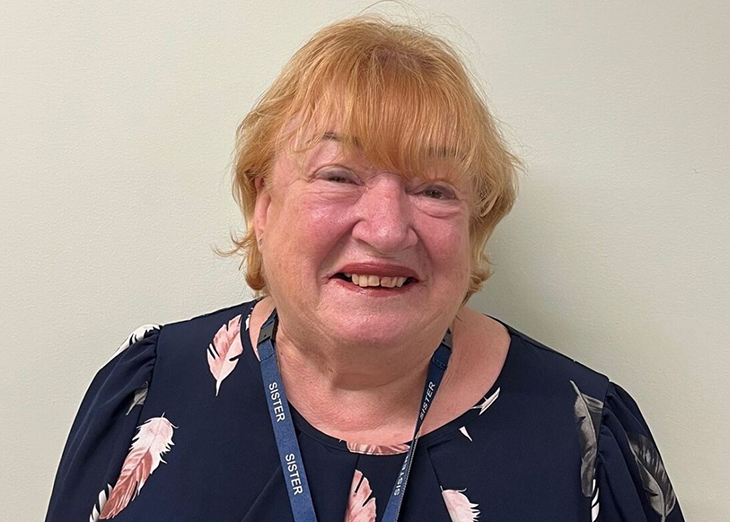When we heard that Marie Doe had been working for the trust for 50 years, we jumped at the chance to interview her as part of our NHS 75 celebrations and to find out more about her experiences at the trust over the past 50 years.

Marie is a cardioversion nurse in the Coronary Care Unit (CCU) at Eastbourne District General Hospital. Cardioversion is a procedure used to return an abnormal heartbeat to a normal rhythm, used when the heart is beating very fast or irregularly – called an arrhythmia.
Marie does the cardioversion herself, without a doctor present, while the patient is under conscious sedation. She also follows up with the patients herself in the atrial fibrillation clinic, six weeks after the procedure.
“I qualified in April ‘73 and worked on a medical ward in St Mary’s, the old hospital” says Marie. “In ‘79 I asked George Bordoli, who used to be the matron on CCU, if I could come and try out coronary care and I haven’t looked back since. When George left, I didn’t want the job as matron really, but they persuaded me to go for it. I couldn’t believe that I got the job. I was really over the moon! When I retired around five years ago, I came back on our temporary workforce (TWF).
“I love my job. I retired and stayed away for a month, but I returned. I do a lot more now than I did when I was the matron. The cardioversion service is very good here and the waiting list is only until June because I do a Saturday twice a month. Patients seem to like me because I get phone calls back!
“I love doing this procedure. I have senior house officer’s (SHO’s) and registrar’s coming to watch me because I use paddles rather than hands free. I sometimes do talks to our post graduates about cardioversions too and I’ve had really good feedback.”
We asked Marie about the changes she’s seen in the trust over the past 50 years.
“When I first worked on CCU, a patient who’d had a heart attack would be in for a week to 10 days. They’d be in bed for a few days and you’d get them up slowly. Now, when they’ve had a heart attack, they go to the lab and have an angioplasty and they might even go home the next day.
“There used to be a lot of patients on lignocaine infusions [local anaesthetic given by a pump] because of arrhythmias. There used to be patients who would go into cardiogenic shock because they would lose 40% of their left ventricle following a heart attack. But because things have improved so much, we don’t get as many patients in cardiogenic shock which can only be a good thing.
“Looking to the future I think there will be more improvements in cardiovascular health. I hope that they do more primary prevention. Complications following a heart attack are much lower and you don’t have as many deaths. My colleagues in the CCU are excellent and it’s a really good unit. We’ve got a fantastic head of nursing here, Davina, and it’s a happy place. We’ve always gone above and beyond.
“I feel really happy to have worked here for 50 years! It’s my home. It’s a really good unit, a very well-informed unit with very knowledgeable people and you learn a lot. You get a lot out of it and I wouldn’t like to go anywhere else.”
